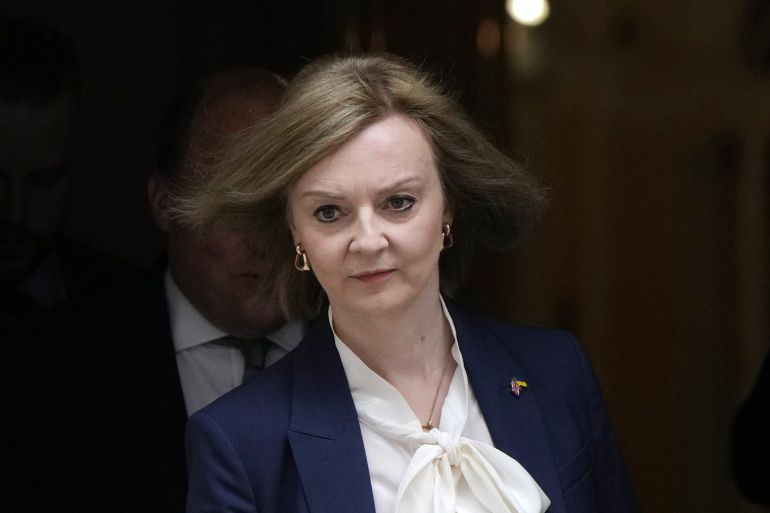UK sets out new law to change post-Brexit Northern Ireland trade
The EU says it will ‘respond with all measures at its disposal’ if the UK goes ahead with unilateral changes to the protocol.

The United Kingdom has set out steps to try to break the deadlock with the European Union on post-Brexit trade with Northern Ireland, lining up a new law that would effectively override parts of a deal and further inflame ties with Brussels.
In a statement to parliament on Tuesday, Foreign Secretary Liz Truss said planned legislation would ease the movement of goods, apply the UK’s tax regime in Northern Ireland and hand London more say over the laws governing the province.
Keep reading
list of 4 itemsSinn Fein hails ‘new era’ after historic Northern Ireland vote
What’s behind Sinn Fein’s victory in Northern Ireland?
UK rejects EU proposals to resolve Northern Ireland trade dispute
She repeatedly told members of Parliament that the legislation would not break international law and would only be brought in during the coming weeks, eager to underline a desire to press on with talks with Brussels to try to find a negotiated solution.
But despite EU warnings about taking unilateral action, the new law would change parts of the so-called “Northern Ireland protocol”, agreed with the bloc as part of a Brexit deal.
The EU said it “will need to respond with all measures at its disposal” if the UK goes ahead with unilateral changes.
The announcement by Truss “raises significant concerns,” European Commission Vice President Maros Sefcovic said in a statement.
“The [Northern Ireland] Protocol is an international agreement signed by the EU and the UK. Unilateral actions contradicting an international agreement are not acceptable,” he said.
Irish Foreign Minister Simon Coveney said he “deeply” regretted the UK step, which he called “damaging to trust”.
Prime Minister Boris Johnson agreed to the protocol in 2019 to allow the UK to leave the EU’s single market and customs union without controls being re-imposed on the border between the Irish Republic and Northern Ireland, vital to the 1998 Good Friday peace deal that ended three decades of violence.
By striking such a deal, he effectively agreed to a customs border between Northern Ireland and the rest of the UK. The UK now says the protocol is unworkable, and months of talks with the EU have failed to find solutions.
“I am announcing our intention to introduce legislation in the coming weeks to make changes to the protocol,” Truss told parliament to jeers from the opposition.
“Our preference remains a negotiated solution with the EU and in parallel with the legislation being introduced, we remain open to further talks,” she said, adding that the UK did not want to scrap the protocol, just to deliver on its “objectives”.
The move to outline the legislation, which foresees a “green channel” for those goods moving from the UK to Northern Ireland and no further, was approved by Johnson’s cabinet team.
On Monday, Johnson said the government needed an “insurance” option to be able to unilaterally override some post-Brexit trade rules because the protocol, as is, was threatening a hard-won peace in the British-ruled province.
Stephen Doughty, foreign policy chief for the opposition Labour Party, agreed there were problems with the protocol but said the UK needed “calm heads and responsible leadership”.
“It is deeply troubling for the foreign secretary to be proposing a bill to apparently break the treaty that the government itself signed just two years ago, that will not resolve issues in Northern Ireland in the long term, and rather it will undermine trust,” he said.
The EU has repeatedly said any trade difficulties must be resolved within the parameters of the protocol.
Coveney said last week the EU would launch legal action and possibly impose countermeasures if London took unilateral action.
The EU’s financial services commissioner, Mairead McGuinness, Ireland’s representative on the EU’s executive, again repeated that unilateral action would not be helpful.
“Political will is required, I hope today we will see some semblance of that, not some very hard unilateral action,” she told Irish broadcaster RTE.
The UK has postponed bringing in many of the checks foreseen by the protocol, which has snarled some foodstuffs in red tape at a time when food and energy prices are rising, fuelling recession concerns.
It also has past form in using shock tactics to try to force talks with the EU.
In 2020, British officials used the threat of an Internal Market Bill to “shake things up”, but the most controversial parts of it were dropped when agreement was reached with the EU.
The outcome of regional elections in Northern Ireland increased pressure on Johnson to introduce changes to the protocol after unionists refused to join a new administration unless there were changes to the trading rules.
Jeffrey Donaldson, leader of the largest pro-British grouping the Democratic Unionist Party, welcomed Truss’s commitment to action but he reserved judgement about whether his party would as yet return to the power-sharing administration.
“We hope to see progress on a bill in order to deal with these matters in days and weeks, not months,” Donaldson told parliament. “We want to see the Irish Sea border removed.”